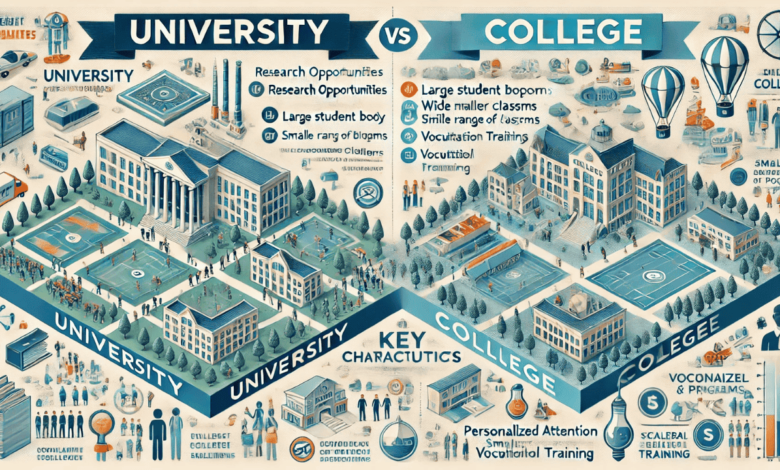Understanding the Difference Between University and College

Education plays a critical role in shaping careers and futures, and the decision to attend a university or college is often pivotal for students. While these terms are sometimes used interchangeably, they differ significantly in scope, structure, and purpose. In this blog post, we will explore the difference between university and college to help prospective students make informed decisions about their educational paths.
Definition of College
A college is typically a smaller institution that focuses on undergraduate education. Colleges may offer associate, bachelor’s, and sometimes master’s degrees, but their range of courses is often limited compared to universities. In many countries, colleges are affiliated with larger universities, functioning as specialized branches that offer programs in specific fields like liberal arts, business, or engineering. Colleges are known for their intimate settings, smaller class sizes, and personalized attention. This environment fosters close interactions between students and faculty, making it ideal for individuals who prefer a focused learning experience.
Key Characteristics of Colleges:
- Smaller student populations
- Limited course offerings
- Focus on undergraduate programs
- Personalized attention from faculty
- Sometimes affiliated with universities
In the United States, community colleges are a popular option for students seeking two-year associate degrees or vocational training. These institutions often provide a cost-effective entry point for higher education, with the option to transfer to universities later.
Definition of University
A university, on the other hand, is a larger institution that offers a broader range of academic programs, including undergraduate, graduate, and professional degrees. Universities are often hubs for research and innovation, with dedicated facilities and resources to support advanced studies. Universities usually consist of multiple colleges or schools, each focusing on a specific discipline. For example, a university may house a College of Business, a College of Engineering, and a School of Medicine. These subdivisions operate under the umbrella of the university but maintain their unique administrative structures.
Key Characteristics of Universities:
- Larger campuses and student populations
- Wide range of academic programs
- Research opportunities and facilities
- Includes graduate and professional education
- Often includes multiple specialized colleges or schools
Universities also have the autonomy to grant degrees, making them independent entities not reliant on affiliation with other institutions. This distinguishes them from some colleges that depend on larger universities for accreditation.
Major Differences Between University and College
Scope of Education:
- Colleges primarily focus on undergraduate education, offering fewer courses and degree options.
- Universities provide a wide array of programs at undergraduate, graduate, and doctoral levels.
Research Opportunities:
- Research facilities are generally not available at colleges.
- Universities are known for their research contributions, offering numerous opportunities for students and faculty to engage in innovative projects.
Size and Infrastructure:
- Colleges are smaller in scale, with limited campuses and fewer students.
- Universities are expansive, often resembling small cities with diverse facilities like libraries, laboratories, and sports complexes.
Governance:
- Colleges may operate independently or as affiliates of larger universities.
- Universities are autonomous institutions with their governance structures, led by a vice-chancellor or equivalent.
Degree Offerings:
- Colleges typically offer associate and bachelor’s degrees, with limited master’s programs.
- Universities grant degrees across all levels, including doctorates and professional qualifications.
Admission Criteria:
- Admission to colleges is generally less competitive.
- Universities often have stringent admission requirements, especially for advanced programs.
Student Experience:
- The smaller size of colleges fosters a close-knit community.
- Universities provide a more diverse environment, accommodating students from various backgrounds and regions.
Global Variations in Terminology
The distinction between colleges and universities varies across countries. For example:
- United States: Colleges and universities differ in size and offerings, but the terms can sometimes overlap. Some institutions, like liberal arts colleges, are prestigious despite their smaller size.
- United Kingdom: A college may refer to a secondary school or a constituent part of a university, such as Oxford or Cambridge colleges.
- Canada: Colleges focus on vocational training and diplomas, while universities emphasize degree programs and research.
- India: Colleges are often affiliated with universities, which oversee examinations and grant degrees.
Understanding these regional differences is essential for international students exploring global education options.
Benefits of Attending a College
Personalized Attention:
Smaller class sizes mean more direct interaction with professors.
Cost-Effectiveness:
Tuition fees at colleges are generally lower than at universities.
Focused Learning:
Limited course offerings allow students to specialize in specific fields.
Community Environment:
Colleges often provide a close-knit community, enhancing the student experience.
Benefits of Attending a University
Diverse Programs:
Universities offer a wide variety of academic disciplines.
Research Opportunities:
Students can participate in cutting-edge research projects.
Global Recognition:
Degrees from universities often carry more weight internationally.
Networking Opportunities:
Larger student bodies and alumni networks provide extensive career connections.
Making the Right Choice
Choosing between a college and a university depends on individual goals, preferences, and circumstances. Here are some factors to consider:
Career Goals:
- If your career path requires advanced degrees or research, a university may be a better choice.
- For vocational training or a specific undergraduate focus, a college might be ideal.
Budget:
- Colleges are generally more affordable, making them suitable for students with financial constraints.
Learning Style:
- Students who prefer smaller classes and personalized attention may thrive in a college environment.
- Those seeking diverse experiences and resources may benefit from a university setting.
Location:
- Consider whether you prefer the intimate setting of a college or the bustling environment of a university campus.
Conclusion
The difference between university and college lies in their size, scope, and offerings, but both serve essential roles in the education system. Colleges are ideal for students seeking personalized, focused learning, while universities cater to those aiming for advanced degrees and diverse opportunities. By understanding these distinctions, students can align their educational choices with their long-term goals, ensuring a fulfilling and successful academic journey. Whether you choose a college or a university, remember that both can provide pathways to personal and professional growth. Your decision should reflect your aspirations, needs, and circumstances, leading you toward a brighter future.




u0wbid